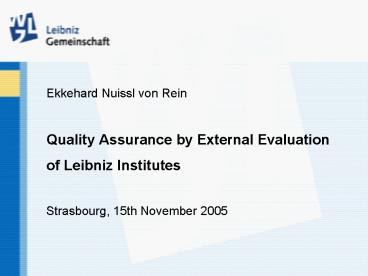Ekkehard Nuissl von Rein - PowerPoint PPT Presentation
1 / 21
Title:
Ekkehard Nuissl von Rein
Description:
The 84 research institutes and scientific service facilities ... Primate Centre. Information Centre for Social Sciences. 1. The Leibniz Association. Location ... – PowerPoint PPT presentation
Number of Views:23
Avg rating:3.0/5.0
Title: Ekkehard Nuissl von Rein
1
- Ekkehard Nuissl von Rein
- Quality Assurance by External Evaluation
- of Leibniz Institutes
- Strasbourg, 15th November 2005
2
- 1. The Leibniz Association
- 2. External Evaluation Procedure of the Leibniz
Association - 3. Results of the External Evaluation
3
1. The Leibniz Association
German Publicly Funded Non-University Research
System
Problem-oriented Research
Helmholtz Association
Leibniz Association
4
1. The Leibniz Association
The 84 research institutes and scientific service
facilities of the Leibniz Association are divided
into sections A Humanities and Education
Research (14 institutes) B Economics, Social
Sciences and Regional Infrastructure
Research (17) C Life Sciences (21) D
Mathematics, Natural Sciences and Engineering
(23) E Environmental Sciences (9)
5
1. The Leibniz Association
- Leibniz Institutes
- address specific scientific problems, which are
socially relevant e.g. - Diabetes Research
- Climate Research
- offer consulting services for different
reference groups, e.g. - Economics
- Adult Education
- offer information or infrastructure services for
research, e.g. - Primate Centre
- Information Centre for Social Sciences
6
Location of the 84 Leibniz Institutes
7
1. The Leibniz Association
- Funding
- Non-profit research organisation
- Institutes are co-financed by the federal and
the 16 state governments - Budget of about one billion , thereof 20 from
third-party funding - About 12,000 employees, about 7,000 academics
8
Organization of the Leibniz Association
President
Section A
Administrative Board
Leibniz Senate
Section B
Section C
Section D
Administrative Office
Evaluation Office
Section E
9
1. The Leibniz Association
- Quality Assurance System
- Scientific excellence and service quality is
ensured by three elements - Internal quality management by the institutes
- Accompanying consulting and evaluation by the
Advisory Boards of the institutes - External Evaluation by the Leibniz Senate
10
2. External Evaluation Procedure
Objectives of the external evaluation procedure
are
- Accountability Assessment whether the institute
meets the requirements of further public
funding formulated as
evaluation criteria - Improvement Recommendation for the institutes
development
11
2. External Evaluation Procedure
- Evaluation criteria
- 1. Scientific Quality of research and service
determining programmatic focus areas and future
prospects theoretical and methodological
foundation of research work efficiency and
effectiveness raising third party funds
12
2. External Evaluation Procedure
- Evaluation criteria
- 2. National and international significance
International standing networking promoting
young scientists political, economic and social
relevance
13
2. External Evaluation Procedure
- Evaluation criteria
- 3. Structure and organization Efficiency of
management and organization, human resource
development, internal quality management
14
Methods
2. External Evaluation Procedure
- Analysis of available documents (budgets etc.)
- Peer review by an expert panel
- Statistical methods, bibliometric data (if
available) - Visit of the institutes departments and
interviews with the institutes staff
15
4 Steps of the external Evaluation Procedure
(2) International expert panels evaluate the
quality of work
(1) Institutes report on their work
1
2
4
3
(3) Leibniz Senate discusses and passes statements
(4) Political Committee (BLK) decides about
further funding
www.wgl.de/evaluation
16
2. External Evaluation Procedure
- The evaluation procedure is based on
principles - Regularity
- Independence
- Transparency
- Acceptance
17
Crucial Points of the Evaluation Procedure
2. External Evaluation Procedure
- Appropriateness of criteria
- Selection of experts
- Acceptance of recommendations
18
- 3. Results of the External Evaluation
- 41 institutes have been evaluated since 2002
- The Leibniz Senate has issued 24 statements
- - 19 institutes will be supported for the next
7 years - - 4 will be re-evaluated in 3 years
- - 1 institute will be partly merged
19
Statistics
20
- Quality Assurance by external evaluation?
- Observations on institutes performance
development - In general institutes have
- - focused their research and service profile
- - increased scientific output, e.g. papers in
reviewed journals - - strengthened international co-operations
- - implemented internal quality management
- - emphasized promotion of young scientists.
21
- Detailed information can be found on our homepage
- www.wgl.de/evaluation
- e.g.
- The Senates statements and evaluation reports
- Questionnaires, tables and information on the
evaluation procedures as well as the Senate
Evaluation Committee

